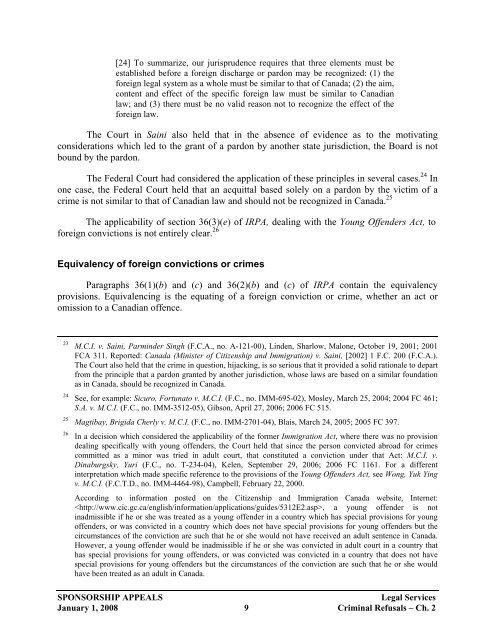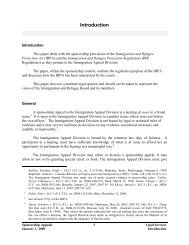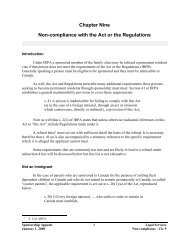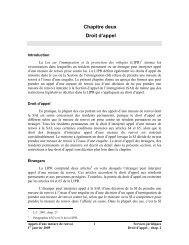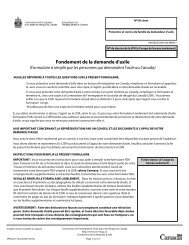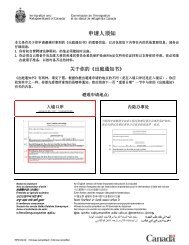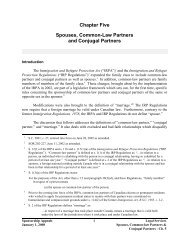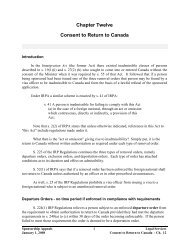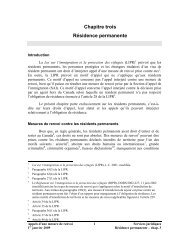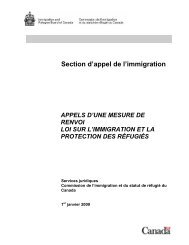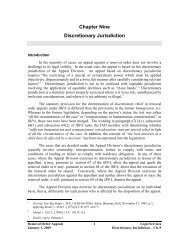Sponsorship Appeals - Immigration and Refugee Board of Canada
Sponsorship Appeals - Immigration and Refugee Board of Canada
Sponsorship Appeals - Immigration and Refugee Board of Canada
You also want an ePaper? Increase the reach of your titles
YUMPU automatically turns print PDFs into web optimized ePapers that Google loves.
[24] To summarize, our jurisprudence requires that three elements must be<br />
established before a foreign discharge or pardon may be recognized: (1) the<br />
foreign legal system as a whole must be similar to that <strong>of</strong> <strong>Canada</strong>; (2) the aim,<br />
content <strong>and</strong> effect <strong>of</strong> the specific foreign law must be similar to Canadian<br />
law; <strong>and</strong> (3) there must be no valid reason not to recognize the effect <strong>of</strong> the<br />
foreign law.<br />
The Court in Saini also held that in the absence <strong>of</strong> evidence as to the motivating<br />
considerations which led to the grant <strong>of</strong> a pardon by another state jurisdiction, the <strong>Board</strong> is not<br />
bound by the pardon.<br />
The Federal Court had considered the application <strong>of</strong> these principles in several cases. 24 In<br />
one case, the Federal Court held that an acquittal based solely on a pardon by the victim <strong>of</strong> a<br />
crime is not similar to that <strong>of</strong> Canadian law <strong>and</strong> should not be recognized in <strong>Canada</strong>. 25<br />
The applicability <strong>of</strong> section 36(3)(e) <strong>of</strong> IRPA, dealing with the Young Offenders Act, to<br />
foreign convictions is not entirely clear. 26<br />
Equivalency <strong>of</strong> foreign convictions or crimes<br />
Paragraphs 36(1)(b) <strong>and</strong> (c) <strong>and</strong> 36(2)(b) <strong>and</strong> (c) <strong>of</strong> IRPA contain the equivalency<br />
provisions. Equivalencing is the equating <strong>of</strong> a foreign conviction or crime, whether an act or<br />
omission to a Canadian <strong>of</strong>fence.<br />
23<br />
24<br />
25<br />
26<br />
M.C.I. v. Saini, Parminder Singh (F.C.A., no. A-121-00), Linden, Sharlow, Malone, October 19, 2001; 2001<br />
FCA 311. Reported: <strong>Canada</strong> (Minister <strong>of</strong> Citizenship <strong>and</strong> <strong>Immigration</strong>) v. Saini, [2002] 1 F.C. 200 (F.C.A.).<br />
The Court also held that the crime in question, hijacking, is so serious that it provided a solid rationale to depart<br />
from the principle that a pardon granted by another jurisdiction, whose laws are based on a similar foundation<br />
as in <strong>Canada</strong>, should be recognized in <strong>Canada</strong>.<br />
See, for example: Sicuro, Fortunato v. M.C.I. (F.C., no. IMM-695-02), Mosley, March 25, 2004; 2004 FC 461;<br />
S.A. v. M.C.I. (F.C., no. IMM-3512-05), Gibson, April 27, 2006; 2006 FC 515.<br />
Magtibay, Brigida Cherly v. M.C.I. (F.C., no. IMM-2701-04), Blais, March 24, 2005; 2005 FC 397.<br />
In a decision which considered the applicability <strong>of</strong> the former <strong>Immigration</strong> Act, where there was no provision<br />
dealing specifically with young <strong>of</strong>fenders, the Court held that since the person convicted abroad for crimes<br />
committed as a minor was tried in adult court, that constituted a conviction under that Act: M.C.I. v.<br />
Dinaburgsky, Yuri (F.C., no. T-234-04), Kelen, September 29, 2006; 2006 FC 1161. For a different<br />
interpretation which made specific reference to the provisions <strong>of</strong> the Young Offenders Act, see Wong, Yuk Ying<br />
v. M.C.I. (F.C.T.D., no. IMM-4464-98), Campbell, February 22, 2000.<br />
According to information posted on the Citizenship <strong>and</strong> <strong>Immigration</strong> <strong>Canada</strong> website, Internet:<br />
, a young <strong>of</strong>fender is not<br />
inadmissible if he or she was treated as a young <strong>of</strong>fender in a country which has special provisions for young<br />
<strong>of</strong>fenders, or was convicted in a country which does not have special provisions for young <strong>of</strong>fenders but the<br />
circumstances <strong>of</strong> the conviction are such that he or she would not have received an adult sentence in <strong>Canada</strong>.<br />
However, a young <strong>of</strong>fender would be inadmissible if he or she was convicted in adult court in a country that<br />
has special provisions for young <strong>of</strong>fenders, or was convicted was convicted in a country that does not have<br />
special provisions for young <strong>of</strong>fenders but the circumstances <strong>of</strong> the conviction are such that he or she would<br />
have been treated as an adult in <strong>Canada</strong>.<br />
SPONSORSHIP APPEALS<br />
Legal Services<br />
January 1, 2008 9 Criminal Refusals – Ch. 2


